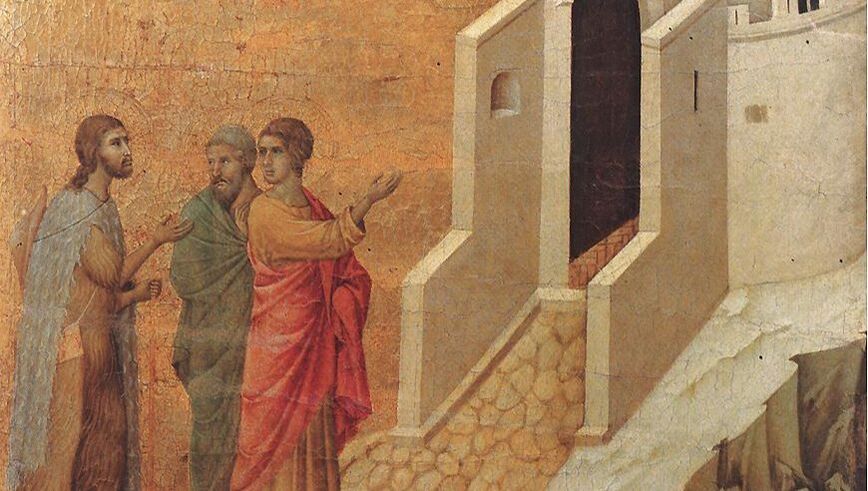|
“Help me!” Out of a dark bathroom in a long term care home, I heard a plaintive cry and froze. I was there to bring the Eucharist, nothing more. I turned to seek out an attendant and heard again, “Don’t leave me!” Heart pounding, I crept forward, identified myself loudly and turned on the lights to find an elderly woman on the toilet. With shaking hands I cleaned her and helped her to stand up. She leaned against me as we washed our hands. Secretly I thought, “I have wiped Christ’s bottom.” Jesus said that whatever we do for the least of his brethren we do for him. This is true whether we cook for our family, give alms to the poor or serve at Mass. However, it might be particularly true when we are called to move out of our comfort zone and give more than we intended to. For example, when we offer to buy a street person a coffee and he chooses a whole meal with it. Or we call to check in on a friend and she spills out her woes for an hour. When we give of ourselves we prefer to have a measure of control over the experience but that is not how God gives of himself. God gave his only son, and Jesus gave his lifeblood for us. God continues to give constantly and completely, so we are called to do the same. This kind of self-emptying service is what Pope Francis called “the art of accompaniment”. “The Church will have to initiate everyone – priests, religious and laity- into this “art of accompaniment” which teaches us to remove our sandals before the sacred ground of the other.” (Evangelii Gaudium 169) I am coming to understand The Art of Accompaniment through a series of talks given by Fr. Tim Boyle at St. Martha’s Parish in Lethbridge . So far Fr. Boyle has noted that accompaniment is not quite the same as caregiving, although it might include that. To accompany someone is to first of all recognize that God is with them. As guest speaker Reno Guimond said, “We are not bringing God to anyone. God has been there long before we show up. We go to see where God is.” Besides recognizing God in each person, we also need to understand how God works in the world. Fr. Boyle encouraged his listeners to imagine God “delighting” in the world as he created it. “God has invested himself in creation,” Fr. Boyle said. “This is not a one-time event but an evolving artwork. If God accompanies us as an artist not as an engineer then God is vulnerable to the unfolding of Creation… God suffers in the process… God chooses to spend himself on creation.” This form of sacrificial support was expressed ultimately by God becoming human and Jesus’ death and resurrection. For us, sacrificial giving of ourselves is often a challenge. Society dictates that one must preserve oneself, must learn to ‘Say No’, and ration one’s time and energy. Yet Creation shows otherwise. Fr. Boyle used the examples of salmon making death runs upstream to spawn, and sunflowers drying up to produce seeds for food and for procreation. “Like salmon and sunflowers, every creature, in order to reach their full potential, needs to empty themselves out”, Fr. Boyle said. So how is this achieved in practical terms? How does one accompany another person, whether continuously or when called upon? It begins when we accept God’s accompaniment of us. This happens through grace which Fr. Boyle suggests is “like manna – something given by God every day which cannot be stored up but only taken advantage of that day.” Grace is not a weapon or superpower, it doesn’t enhance our abilities. Indeed it requires us to first accept that we have no ability without God. We are flawed and vulnerable beings made precious by God’s acceptance. It is God’s grace that sustains us, sanctifies us. When we understand this dynamic we are better prepared to handle the vulnerability of others, to accept it, and handle it gently. Since my first incident of extreme vulnerability in long-term care, my ministry partner and I have been called upon to assist a few others at their times of greatest need, in life and even approaching death. While I still feel my heart pounding each time, the experiences have been deeply humbling. I know God is helping me learn how to cherish the sacred ground of others.
1 Comment
Mona Gale
11/14/2022 10:32:51 am
How we respond when we encounter others in need, is truly the answer to serve as Jesus did. That is God's grace at work in us His instruments. I think sometimes we hesitate because of our fear of breaking the "rules" - maybe we need to step out of that and help first and answer later. Thank you for having a servant's heart.
Reply
Your comment will be posted after it is approved.
Leave a Reply. |
Author
Catholic Pastoral Centre Staff and Guest Writers Archives
July 2024
Categories
All
|


 RSS Feed
RSS Feed